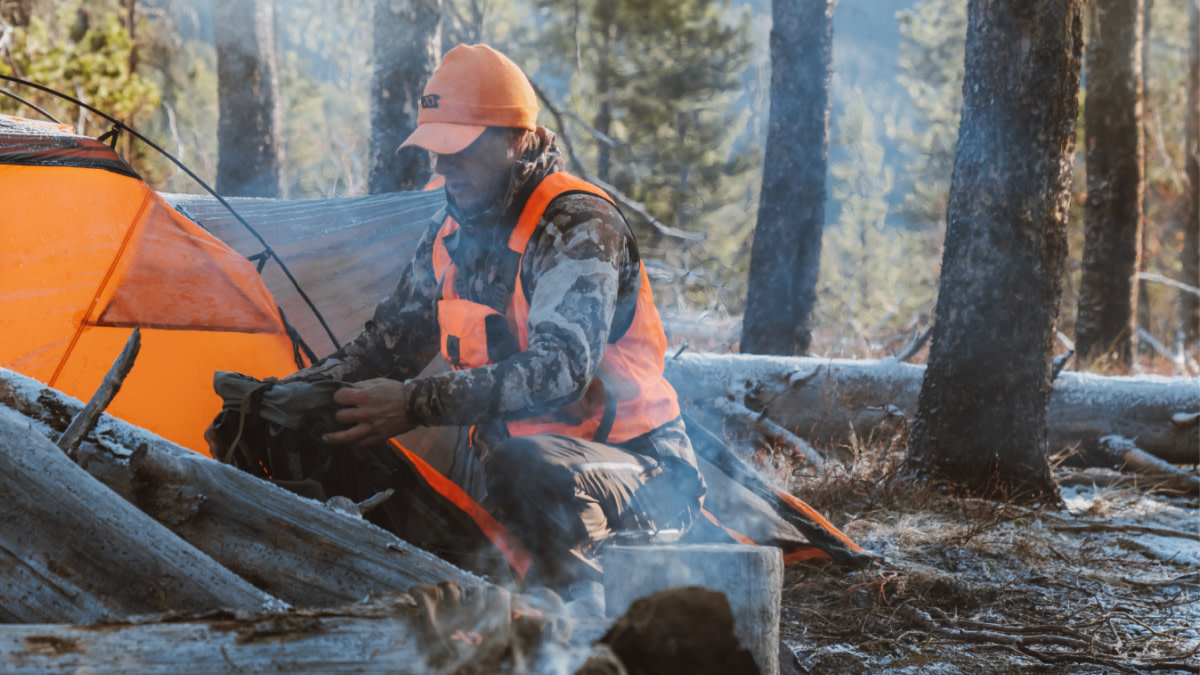Excerpt from Steven Rinella’s “The MeatEater Guide to Wilderness Skills and Survival”

This excerpt is from Steven Rinella’s “The MeatEater Guide to Wilderness Skills and Survival.” You can preorder it online right now or find it in bookstores on December 1.
A friend of mine used to work for a guiding company that ran extended mountain backpacking trips for high school students. Their leading cause for medical evacuations wasn’t snakebites, bear attacks, or even hypothermia. It was cooking accidents, usually burns involving camp stoves, fires, or boiling water. This mirrors the arc of my own childhood experience with injuries and accidents. We had virtually unlimited access to BB guns, .22s, Rambo knives, double-bit axes, and ninja throwing stars. But what usually got us into trouble was fire. In fact, one of the most memorable injuries I witnessed was caused by a flaming marshmallow that landed on my brother’s chest rather than inside his s’more.
And then there are the honest mistakes and slip-ups that come in such a wide variety of forms that it tests one’s imagination: an ice fisherman who falls through the ice and is found the next day frozen to death with his elbows still propped up on the edge of the hole he fell through; a pair of campers who die from carbon monoxide poisoning after dozing off while trying to warm their tent with a propane stove; a mountain goat researcher who tried to leap over a section of washed-out trail on a steep slope rather than finding an alternative route; a bowhunter impaled by an arrow that fell from his buddy’s quiver and landed in just the right position on the path ahead of him; a man who died of exposure after he got out of his truck to unlock the gate on the road to his remote cabin and then had the truck roll forward to pinch him between the bumper and the still-locked gate. At the risk of alienating doomsday preppers who bought this book in order to fantasize about the zombie apocalypse, the greatest survival challenge you might encounter is the person staring back at you in the mirror.
I once published an essay in Outside magazine about all of the unexpected diseases and parasites that I’ve picked up through a life spent out-doors, including trichinosis, giardiasis, and Lyme disease. In the essay, I recount a lecture and slideshow that I attended in Santa Fe, New Mexico, given by a mountaineer who’d recently attempted an ascent of Mount Everest. During his talk, the climber mentioned a well-known study in which psychologists instructed subjects to watch a video. In the video, a small group of people were playing catch. The subjects were instructed to count how many times the balls passed between the players, who were identified by the color of their T-shirts. For a while the tossing and catching carry on without incident. Then a guy wearing a gorilla suit strolls through the middle of the game, which continues as if nothing had occurred. What’s interesting is that half of the study subjects fail to register the gorilla’s presence at all. The point of the study was to examine some-thing called inattentional blindness—the failure to notice a fully visible but unexpected object because attention was engaged on another task, event, or object. The mountaineer put a rather fine point on it: people who notice the gorilla are the ones who survive the mountain; those who don’t, do not.
I mention the mountaineer’s observation often, because it manages to be both spot-on and only half true. Learning to pay constant attention to your surroundings, with an eye to both your immediate environment and landmarks far off in the distance, is one of the greatest outdoor skills that a person can develop. Doing so will help you avoid many bad situations. But it won’t altogether prevent them. No matter how alert you are, spend enough time outside and you’re virtually guaranteed to find your-self in a tough spot. It could be a situation that threatens to derail your plans, or it could be one that derails your life. Believe me, I have lived through many, from getting lost to hypothermia to grizzly charges. And if you’re out in the wilderness, you will, too. It’s my hope that if and when you do, the practical skills and knowledge found within this book will enable you to save the day.
Before you get too deep into this book, I’d like to acknowledge a potential problem that might come from reading it. Along with hundreds of tips and tricks that will help you be more confident and competent in the woods, we describe a great many hazards that can be found in nature. I realize that pondering these hazards could result in paranoia about the dangers of the wild. It is not our goal to create those fears, or to reinforce any existing fears that you might have about wild animals or wild places. Instead, our view is that knowledge is power. By learning the actual risks associated with an outdoor lifestyle, we believe that you’ll be able to shift your attention away from irrational or unproductive concerns and focus instead on the things that actually matter. When you are educated and prepared for risk, coping with it is easy. At times it can even be enjoyable.
So dig in. Read, study, and memorize. Then head out to practice and make experiences for yourself. And remember, always, that the natural world is sacred and deserves our love and respect. To touch nature is to touch the hand of God. This book is not about running away from the wild. It’s about running into her arms, headlong and with an open heart.




Conversation